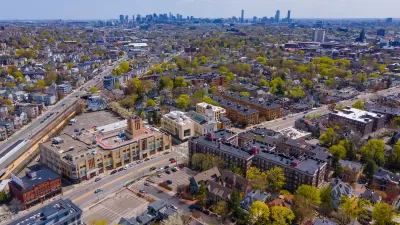The McKinsey Global Institute wants to help California build 3.5 million homes by 2025.

"California will have to build about 3.5 million homes over the next eight years, more than triple its current pace of construction, simply to keep up with expected population growth and hold down housing costs to affordable levels," begins an article by Conor Dougherty and Karl Russell.
That premise introduces the policy recommendations contained in a new report from the McKinsey Global Institute. The "Closing California's housing gap" provides a toolbox to help the state increase housing production in an era of scarcity, constrained by various levels of local controls. "Those ideas include streamlining grants of local permits, and using tax policy to withhold money from anti-growth cities that drag their feet on new housing," according to Dougherty and Russell.
The headlining policy idea, however, is to build on the vacant plots of land in the state's urban areas. The article includes maps of the Los Angeles region and the city of San Francisco, showing the broad swaths of land available to build "225,000 or so homes and apartments."
An article on the McKinsey Global Institute website has more on the methodology and findings of the study:
To understand the nature of the problem, we built a quantitative model to identify California’s housing affordability gap by household and location. To do this, we segmented the state’s more than 12 million households into 34 housing markets and 16 income bands, and assessed each household’s ability to afford housing in their local market. We learned that 50 percent of California’s households cannot afford the cost of housing in their local market. Virtually none of California’s low-income and very-low-income households can afford the local cost of housing.
FULL STORY: No Vacancies in California? Housing Report Begs to Differ

Alabama: Trump Terminates Settlements for Black Communities Harmed By Raw Sewage
Trump deemed the landmark civil rights agreement “illegal DEI and environmental justice policy.”

Study: Maui’s Plan to Convert Vacation Rentals to Long-Term Housing Could Cause Nearly $1 Billion Economic Loss
The plan would reduce visitor accommodation by 25% resulting in 1,900 jobs lost.

Planetizen Federal Action Tracker
A weekly monitor of how Trump’s orders and actions are impacting planners and planning in America.

Wind Energy on the Rise Despite Federal Policy Reversal
The Trump administration is revoking federal support for renewable energy, but demand for new projects continues unabated.

Passengers Flock to Caltrain After Electrification
The new electric trains are running faster and more reliably, leading to strong ridership growth on the Bay Area rail system.

Texas Churches Rally Behind ‘Yes in God’s Back Yard’ Legislation
Religious leaders want the state to reduce zoning regulations to streamline leasing church-owned land to housing developers.
Urban Design for Planners 1: Software Tools
This six-course series explores essential urban design concepts using open source software and equips planners with the tools they need to participate fully in the urban design process.
Planning for Universal Design
Learn the tools for implementing Universal Design in planning regulations.
Caltrans
Smith Gee Studio
Institute for Housing and Urban Development Studies (IHS)
City of Grandview
Harvard GSD Executive Education
Toledo-Lucas County Plan Commissions
Salt Lake City
NYU Wagner Graduate School of Public Service





























